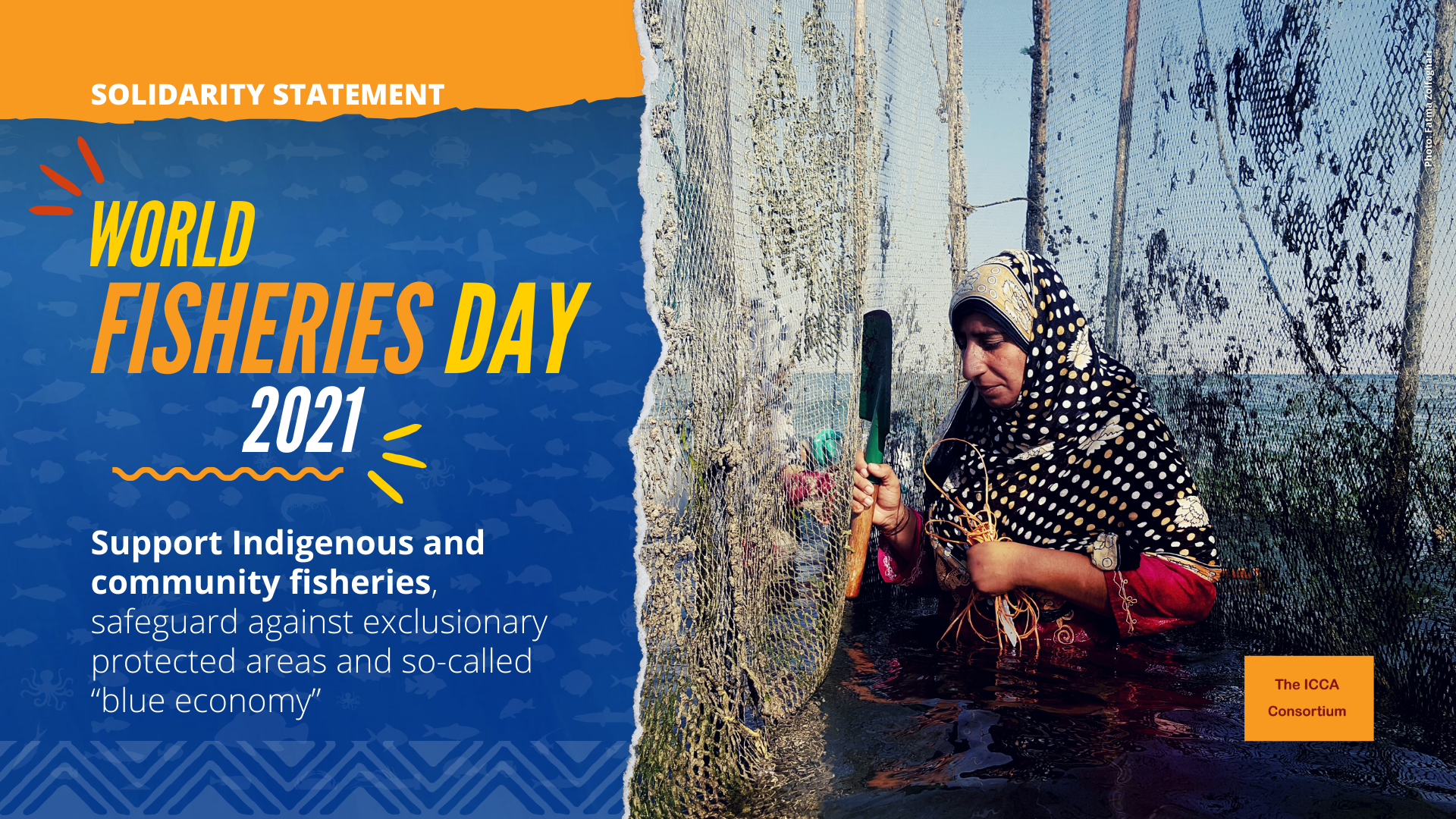Solidarity Statement on World Fisheries Day 2021
First published on 11/19/2021
Small-scale fishers worldwide came together and founded a global movement — the World Forum of Fisher Peoples — on November 21, 1997. Ever since November 21 has been celebrated as World Fisheries Day. This solidarity statement was prepared in consultation with several Members and Honorary members of the ICCA Consortium whose work focuses on community fisheries.
Indigenous Peoples and local communities are the caretakers and guardians of Mother Earth’s oceans, coasts, rivers, and lakes through their diverse and irreplaceable cultures, governance systems, knowledge, and practices. For many Indigenous Peoples and local communities, fisheries are inextricable parts of their food systems, biocultural diversity, and aquatic territories of life. Through their community fisheries, they contribute significantly not only to local food sovereignty but also to global food security.
Growing global attention on small-scale fisheries is encouraging. However, insufficient distinctions are made between small-scale fisheries in general and Indigenous and community fisheries specifically, and issues core to the latter such as self-determination and self-governance are often overlooked. In addition, the rights and well-being of coastal and marine fishers and fishing communities are significantly undermined in new developments in the maritime economy, also known as the blue economy.
Moreover, the current draft of the “30 by 30” target for protected and conserved areas in the post-2020 global biodiversity framework is hotly debated. This kind of area-based conservation target has significant implications for Indigenous and community fisheries as currently drafted. Existing experience suggests that it could be implemented in ways that will not only create greater inequities and higher pressure on marine resources but also will not produce the mutually desired outcomes of conservation and sustainable management.
In recent weeks, government and private sector donors have made multi-billion-dollar commitments to nature conservation and climate issues, which variably refer to the importance of Indigenous Peoples and local communities. There is an urgent need for critical review and assessment of existing funding mechanisms (through which a tiny fraction of funds goes to Indigenous Peoples and local communities) and the development of different approaches to sharing and redistributing power and wealth. As stated in our 2021 report on territories of life, human rights-based financing could be a key lever for equitable and effective implementation of global commitments, including on biodiversity, climate, and sustainable development. Much more needs to be done to ensure such efforts are defined, led, and guided by Indigenous Peoples and local communities and their organizations, and rooted in broader social movements for systems change.
In this context, global and national policymakers and other stakeholders must do more to support Indigenous Peoples and local fishing and coastal communities to secure their collective territories and areas and access to fishing resources, strengthen their self-determined governance systems, and sustain their cultures and ways of life on their terms. This requires significant reforms in national political and legal systems and international financial and economic systems.
We urge governments, funders, NGOs, and others to fulfill their responsibilities to Indigenous Peoples and local fishing and coastal communities by:
- Recognizing and upholding Indigenous Peoples’ and fishing communities’ rights to self-determination and self-governance of their waters, fisheries and territories of life and supporting their processes of self-declaration and mutual recognition.
- Supporting and enabling Indigenous Peoples, local communities, and traditional resource users (including women and youth) to secure rights to title, tenure, access, and resources as required in existing international instruments such as the FAO Voluntary Guidelines on tenure and on small-scale fisheries and Sustainable Development Goal 14.
- Respecting the right of all peoples, including Indigenous Peoples under UNDRIP, to provide or withhold free, prior, and informed consent for any activities that may affect them (including protected areas, industrial fisheries, and physical infrastructure), and ensuring these and other procedural rights are upheld in practice.
- Valuing Indigenous, local and women’s knowledge systems alongside other sources of scientific and technical knowledge in decision-making and governance of aquatic commons and fisheries.
- Identifying and halting the major drivers of aquatic biodiversity loss and climate breakdown and the specific threats to the lives and livelihoods of communities who are sustaining and defending our planet.
- Undertaking a due diligence process, including free, prior, and informed consent, to avoid overlapping with or otherwise negatively affecting Indigenous Peoples and local communities and their territories of life before funding or taking actions to establish new or expand existing protected or conserved areas.
- Adequately funding and empowering institutions for environmental governance (such as regulating extractive industries, pollution and infrastructure, and protected areas support) and for human rights (including the rights of Indigenous Peoples specifically) at the national and subnational levels.
- Supporting the development of flexible mechanisms for Indigenous Peoples and local communities who are sustaining their customary territories and community fisheries to access policy, technical, financial, and other support in accordance with their self-determined priorities.
- Contributing to and cooperating with mechanisms for transparency and accountability of duty-bearers such as protocols, codes of conduct and rights-based funding requirements.
